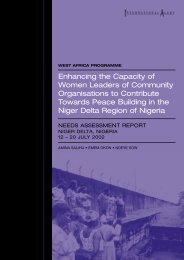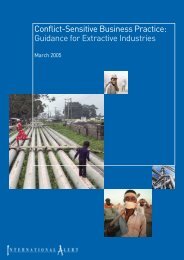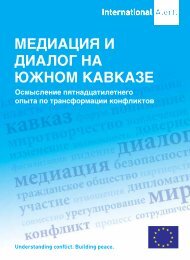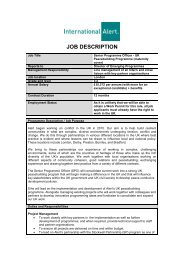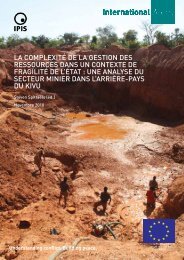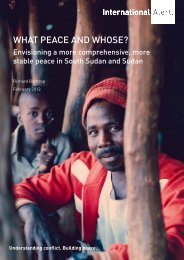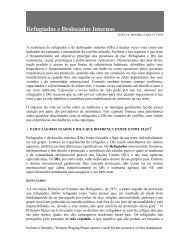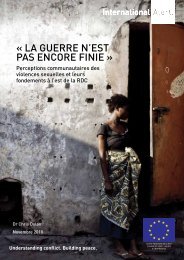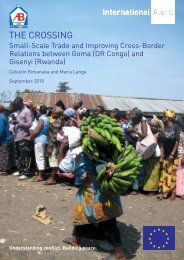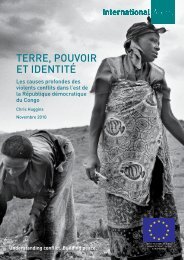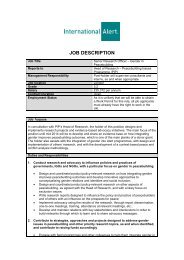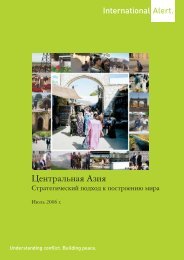Full report - International Alert
Full report - International Alert
Full report - International Alert
- No tags were found...
Create successful ePaper yourself
Turn your PDF publications into a flip-book with our unique Google optimized e-Paper software.
61 • Women’s Bodies as a Battleground: Sexual Violence Against Women and Girls During the War in the Democratic Republic of CongoGiven the extent, nature and devastating consequences of sexual violence on the victims and their communities,it represents a serious public health problem. The rapes have severely affected the physical and mental healthof the victims, the majority (91.5%) of whom suffer from one or more problems such as vesico-vaginal or rectovaginalfistulas, or prolapsed uterus, which require surgery; venereal diseases, which can lead to sterility if theyare not treated appropriately and in good time, and above all HIV infection (as a large proportion of thefighting forces in South Kivu are HIV-positive). But 70% of the women interviewed had received no medicaltreatment after having been raped. Some of them had decided not to go to a health centre, so as not to revealwhat had happened to them, for fear of the stigmatisation and ostracism that was bound to follow. In any case,access to care is almost impossible in a situation where the health care system has almost totally broken down:with no health centres at all or at any rate too far away from many people, looting then closure of numeroushealth care facilities in rural areas, departure of health personnel because of the insecurity, lack of appropriateequipment to treat the more complicated cases – and the majority of victims being too poor to get themselvesto a specialised clinic in a town. Instead, they have had to rely on traditional medicine and medicinal plants.Added to these troubles, the majority (91%) of victims suffer behavioural and psychological problems –constant fear, shame and self-loathing, sweating, insomnia, nightmares, memory loss, aggression – exacerbatedby their experience of being ostracised and stigmatised, especially in the case of rapes resulting in pregnancy,which drives many victims to flee their community to lose themselves in the anonymity of large urban centressuch as Bukavu or Goma.Sexual violence contributes to the erosion of the economic and social foundations of the rural communities ofSouth Kivu. Women and girls represent the main productive force in the rural economy. They are the backboneof small-scale local trading in products for everyday consumption and in essential goods, such as cassava, fish,vegetables, palm oil, salt and soap. Communities depend for their survival on the productive and reproductivework of women. War, sexual violence and the general situation of insecurity have driven many women awayfrom their communities, which are thus left without their driving force. Girls and young women who areabducted and kept confined in the fighters’ camps represent a loss to their communities in terms of workforce,especially when productive young men have been killed in the fighting, or forcibly conscripted into the rebellion.Women farmers who remain in their community can no longer cultivate their fields because their means ofproduction, such as tools for tilling, were stolen from them, while they themselves have been weakened byillnesses resulting from the rapes. Women traders venture less and less on to the roads or to the local marketsto sell their produce. This deprives numerous rural communities of one of their main sources of supply, leadingto cases of severe malnutrition.A tangled web of political, ideological, psychological and socio-cultural factors underlies these acts of extremeviolence. This is borne out by the remarks made by women victims and by the few soldiers and militiamen whowere interviewed. The women interpret the motivation of the fighting forces in various ways. Some of theinterviewees believe the sexual violence is due to the absence in the armed groups of any organised structureand supervision and to the men’s need to satisfy their sexual urges. Others see the acts of violence as a deliberateattempt to humiliate, through women’s bodies, the Congolese people and the whole country, which, they say,is coveted by its neighbours for its vast wealth of resources. More than 50% of the victims are convinced thatthe neighbouring countries plan to destroy and exterminate the Congolese people. They also say that women’sbodies are used as a battlefield by all the fighting forces, including the Congolese. Women are sexually abusedbecause they symbolise their communities; it is through them and through their bodies that the men of thecommunity are targeted. Also, rape is often ritualised, as a means of gaining magic powers or else neutralisingthem. According to beliefs held by many combatants, by raping young pygmy women and girls, or youngvirgins, they will be rendered invincible on the battlefield. Most of the elderly women who are raped, by theRCD and RPA in particular, are accused of being witches in the pay of the Maï Maï. The popular belief is thatthey are the guardians of fetishes which endow the Maï Maï with strength and invulnerability in the field.Raping these women causes the destruction of the power of the fetishes and therefore that of the Maï Maï.The analysis of what drove the fighting forces to commit sexual violence also took into account the socioculturalcontext and women’s status in society in South Kivu and in the whole sub-region, because acts of sexualviolence can be properly understood only in relation to existing social structures and practices. South Kivu, likethe whole of the DRC and the sub-region, is a patriarchal and hierarchical society, where women still generally



